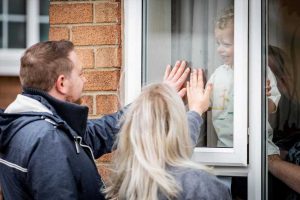When should I self-isolate and how long for? Rules explained – The Sun

SELF-ISOLATION is an important step in slowing the spread of coronavirus in the UK.
But many are unsure when and if they need to isolate. So what does self-isolation mean and how and when should you do it?
What does self-isolation mean?
Self-isolation is when you do not leave your home because you have or might have coronavirus.
Essentially self-isolation means cutting yourself off from the outside world — and no visitors!
It means staying at home from work, school or other public places or public transport or any place where you may spread the virus to others.
Also, make sure you have a well-ventilated room with a window which can be opened.
And while there should be no visitors, it is fine to have friends, family or delivery drivers drop off essentials during this period.
Self-isolation is different to social distancing and shielding.
When should I self-isolate?
Everyone with flu-like symptoms, which is defined as a fever of above 37.8C or a persistent cough, should stay home.
You must self-isolate immediately if:
- You have any symptoms of coronavirus (a high temperature, a new, continuous cough or a loss or change to your sense of smell or taste)
- You've tested positive for coronavirus – this means you have coronavirus
- You live with someone who has symptoms or tested positive
- Someone in your support bubble has symptoms or tested positive
- You're told to self-isolate by NHS Test and Trace
- You arrive in the UK from a country with a high coronavirus risk
But this is changing next month for people who have had vaccinations…
From August 16, double-jabbed Brits will be allowed to skip self-isolation if they have come into contact with a Covid patient.
If you haven't had your two jabs, you will have to isolate.
People who test positive will still have to self-isolate for 10 days even if they're jabbed however.
And close contacts will still be urged to get a gold-standard PCR test to "get certainty" that they're not infected.
How long should I self-isolate for?
How long you need to self-isolate depends on if you have coronavirus or you've been in close contact with someone who does.
If you have symptoms and have not had a test, stay at home and get a test to check if you have coronavirus as soon as possible.
If you have symptoms or have tested positive for coronavirus, you'll usually need to self-isolate for at least 10 days.
You should self-isolate for at least 10 days if:
- You have symptoms of coronavirus and you tested positive, had an unclear result or did not have a test. the 10 days starts from when the symptoms first started.
- You tested positive but have not had symptoms. The 10 days starts from when you had the test – but if you get symptoms after your test, self-isolate for a further 10 days from when your symptoms start.
You can stop self-isolating after 10 days if either:
- You do not have any symptoms
- You just have a cough or changes to your sense of smell or taste – these can last for weeks after the infection has gone
Continue to keep self-isolating if:
- You feel unwell
- You have any of these symptoms after 10 days: a high temperature or feeling hot and shivery, a runny nose or sneezing, feeling or being sick, diarrhoea. Only stop self-isolating when these symptoms have gone.
What if someone else is self-isolating in your home?
Limit contact with them and preferably make sure they stay in one room.
Also, it is important to keep everywhere clean.
People in isolation should constantly wash their hands.
Any rubbish generated by a sick person should be double bagged.
Source: Read Full Article




